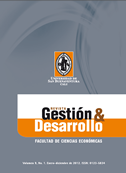La Revista Gestión & Desarrollo proporciona acceso abierto e inmediato a su contenido, basada en el principio de ofrecer al público un acceso libre a las investigaciones para ayuda a un mayor intercambio global de conocimiento.
Excepto que se establezca de otra forma, el contenido de esta revista cuenta con una licencia Creative Commons Attribution-NonCommercial-NoDerivatives 4.0 International (CC BY-NC-ND 4.0) que puede consultar en http://creativecommons.org/licenses/by-nc-nd/4.0/
- Attribution — You must give appropriate credit, provide a link to the license, and indicate if changes were made. You may do so in any reasonable manner, but not in any way that suggests the licensor endorses you or your use.
- NonCommercial — You may not use the material for commercial purposes.
- NoDerivatives — If you remix, transform, or build upon the material, you may not distribute the modified material.
- No additional restrictions — You may not apply legal terms or technological measures that legally restrict others from doing anything the license permits.
Abstract
The accounting profession has been important for the security and control of economic and financial information, vital issue to any company. It provides micro and macroeconomic planning, promotes the creation and efficient capital allocation and enables proper functioning of institutions and economic units. The accountant plays an important role in decision-making of economic entities and has extensive social and normative trust. In Colombia, according to Law 43 of 1990, the public accountant gives public faith, an issue that symbolizes the confidence of his word about his work. The business world is undergoing drastic changes in the way it does business, reason why the accountant professional should have global comprehensive training. Colombia is currently in the convergence of international accounting standards, audit and assurance (IAS/IFRS; ISA), and in this sense, educational processes are vital in the implementation of international standards. Globally, these processes are raised by the IES (International Education Standards) promulgated by the International Federation of Accountants (IFAC) and born from the need to train competent, skilled and experienced professionals, able to act ethically.
Keywords:
References
– SABOGAL, K. (2012). Estándares internacionales para la educación contable. Tomado de:http://www.ilustrados.com/tema/7691/Estandares-Internacionales-para-Educacion-Contable.html.
– SELTZER, J. (2008). IFAC y la formación de contadores profesionales. Tomado de: http://www.facpce.org.ar/web2011/files/img_prof_art_tec/ifac_y_la_formaciónde_contadores.Pdf









